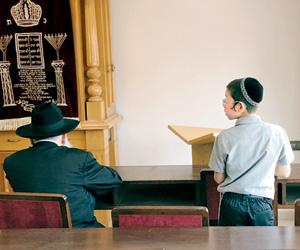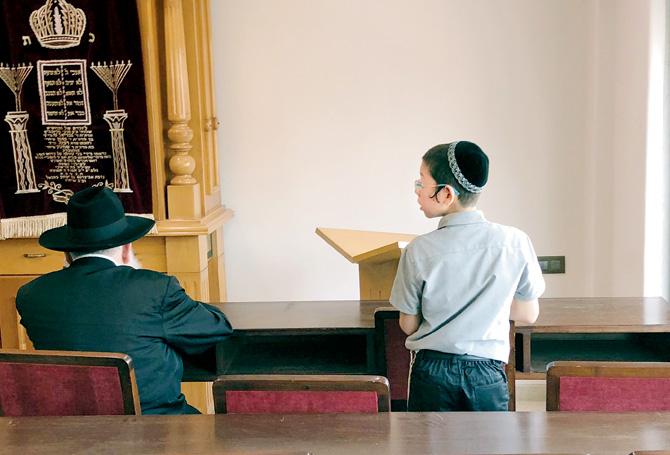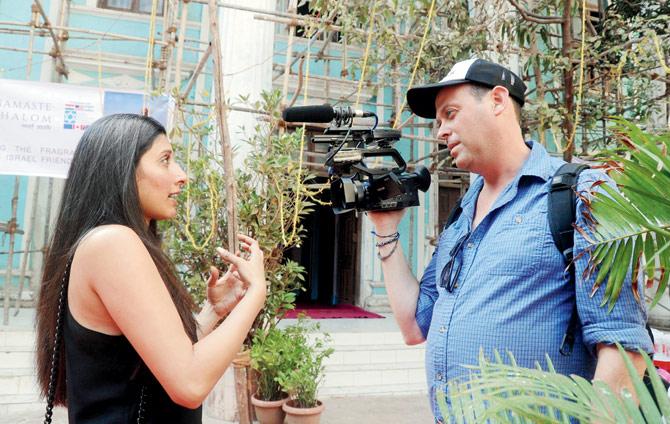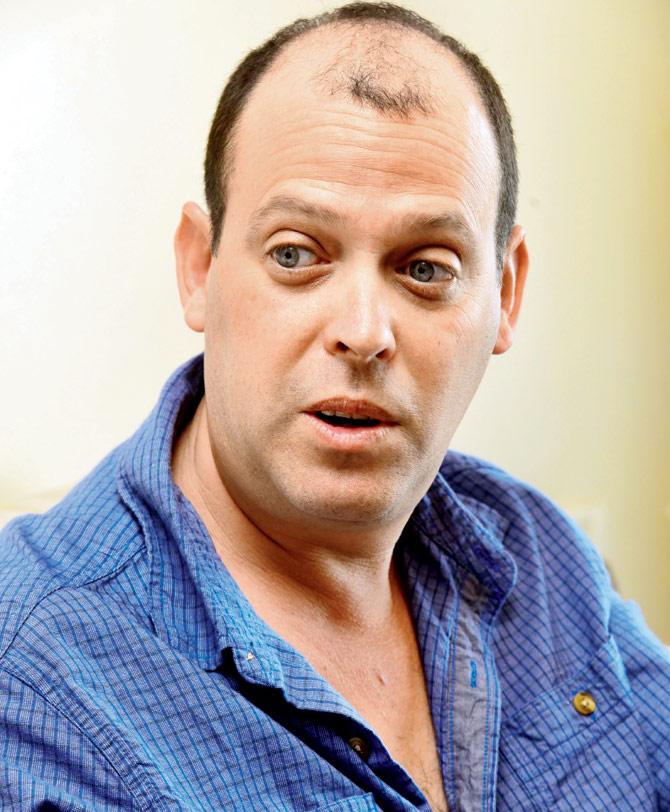An Israeli docu maker turns his lens on the Jewish community of Mumbai in the same week that 26/11's youngest survivor makes his first visit to Chabad House


Moshe Holtzberg praying with the Rabbi at Chabad House on Wednesday. Oren Rosenfeld, Israeli documentary maker, who flew with the family to Mumbai from Tel Aviv on Tuesday says the 11-year-old is aware of his past and what it represents. Pic Courtesy/Oren Rosenfeld
ADVERTISEMENT
It's nearing 4.30 pm, and there's much activity at the Magen David Synagogue in Byculla. Carpets are being laid out and guests who will probably have to wait long are being offered tea and coffee. There's a lawn outside where - with the sun not at its shiniest best thanks to Mumbai's faux winter - a few tables and chairs have been laid out with white satin sheets that the brain registers as celebratory. In the midst of the activity, avoiding the scaffolds that still line the freshly painted blue walls of the 154-year-old synagogue, stands Devina Sankar, a Los Angeles resident who is in Mumbai on a three-week vacation. Looking into a Sony PXW-X70 handycam, she reminisces her school days spent next-door, where as a naughty student she'd often have her ears twisted. It elicits a sound of surprise from the man behind the camera, Oren Rosenfeld. An Israeli filmmaker, in India to document Mumbai's Jewish community, Rosenfeld is collecting several such accounts of the Jewish community's India experience.
In between interviews with his subjects, primarily Eddna Samuel (a Parel resident who Rosenfeld poetically calls the needle through which he will thread the narrative of his feature-length documentary), he points out that the synagogue, which is currently being prepped for the launch of a monthly magazine celebrating India-Israel ties and the Jewish community here titled, Namaste Shalom, is a Baghdadi-Jew synagogue. It's a community that most recall for its best-known Mumbai member, David Sassoon. "What's interesting here is that the Baghdadi Jews and Bene-Israelis [Jewish settlers in India who trace their history to the Lost Tribes] have come together. There are certain prayers in Judaism that cannot be conducted if there are less than 10 men. So, to fulfill that requirement, the Bene-Israelis come over to Baghdadi synagogues to up numbers," he adds.

Rosenfeld meets Baby Moshe's uncle Moshe Holtzberg at the Nariman Point home of common friend Suril Desai, also executive producer of the Mumbai Jews documentary. Moshe Senior, a Rabbi, lives in New York, and has flown in for the three-day visit of the family to Chabad House which he worked to ensure was not shut down. Rosenfeld says that while members of the Chabad House usually don’t mingle with other Jewish communities, the 26/11 attacks changed that in Mumbai, achieving the opposite. Pics/Atul Kamble
The timing of the magazine's launch, admits Rosenfeld, couldn't have been better. While the media seems to have almost given this a miss, just a few kilometres away Prime Ministers Narendra Modi and Benjamin Netanyahu are setting the stage for better economic and strategic ties between the two countries at Colaba's Hotel Taj Mahal Palace. "But, I don't think they planned it that way."
Almost as if answering a question unasked, Rosenfeld, who runs the Jerusalem-based Holy Land Productions and has worked on projects for the BBC and National Geographic, says "I don't need to be there [i.e. Colaba]. I already have great shots from yesterday." What Rosenfeld refers to is the almost exclusive access he enjoyed as a journalist to Baby Moshe, 11, whose parents Rabbi Gavriel Holtzberg and Rivka Holtzberg were killed during the terror attacks at Chabad House on November 26, 2008. Baby Moshe (referred to as such because he shares his first name with his uncle) made his first visit to Mumbai post 26/11 on Tuesday amidst much media frenzy. Rosenfeld was invited by the Holtzberg family (Gavriel and Rivka's parents) to travel with them on the flight from Tel Aviv to Mumbai last week, and later Baby Moshe's first steps into Nariman House after the time his parents were killed along with four others.

Devina Sankar, a Los Angeles resident in Mumbai on a three-week vacation, speaks to Rosenfeld outside the Magen David Synagogue in Byculla where the Namaste Shalom magazine was launched on Thursday. Pic/Sayyed Sameer Abedi
On putting the boy through this, Rosenfeld says, "Baby Moshe always has his four grandparents around him. Plus, there's a psychologist who travels with him. He is showing signs of awareness of his past." Rosenfeld, who has a young son the same age as Moshe, says, "In Judaisim, a boy is said to become an adult at the age of 13, which is when the Bar Mitzvah is held. Moshe is almost that age now."
Initially, shy, Baby Moshe soon became comfortable with Rosenfeld's presence. A photograph the filmmaker picks from his iOS gallery is of the child standing before a luggage conveyor belt at Mumbai T2 alone. "He stepped away from his grandparents and waited at the carousel to pick up his heavy bag," he says, about a symbolic scene.
Chabad House, says the 41-year-old filmmaker, across the world has represented a community that has stood away from local communities. "They are more traditional and have stricter kosher rules." What the Mumbai attacks did, however, was to bring all of the city's Jews together. "On Tuesday, at a local Jewish community event, Moshe's grandparents were invited to speak. This [members of a Chabad House mingling] doesn't happen anywhere. If the idea of the terror attack was to shake the community, it did the opposite. It only made them stronger."

Yet, this might only inform a small part of the documentary. Had it not been for the connection between the communities forged after the attacks, the two would have been separate entities. What he is looking for is a Mumbai Jew's life in the city. "In Israel you have a lot of Jews who have come from different countries. However, the ones from India still share a deep connect with the country. They are in touch with their families and return here for vacations."
The travel back and forth is important. Samuel, when the camera is turned away from her, expresses how a multi-entry visa would help everyone. But that's for the PMs' ears. For Rosenfeld's camera, she talks about the excitement of seeing an article, on her life and her community, appearing in Namaste Shalom. And, when that's done, Rosenfeld disappears into the sidelines and records the rest of the evening. A coffee he was drinking is hastily put to rest on the floor as a BJP dignitary he probably doesn't recognise makes a late entry.
Download the new mid-day Android and iOS apps to get updates on all the latest and trending stories on the go
 Subscribe today by clicking the link and stay updated with the latest news!" Click here!
Subscribe today by clicking the link and stay updated with the latest news!" Click here!






